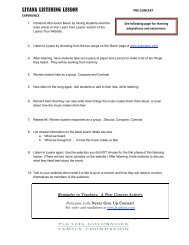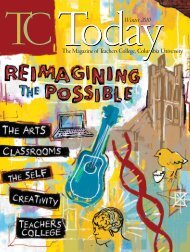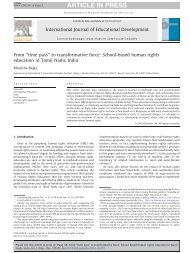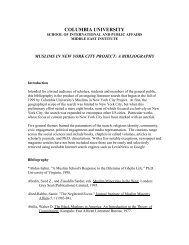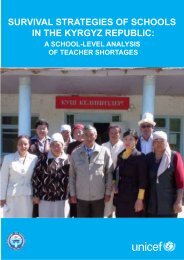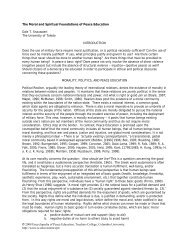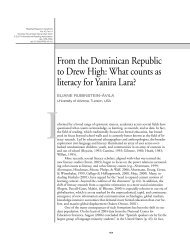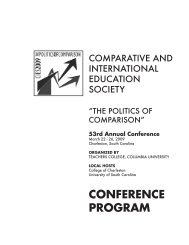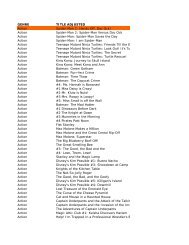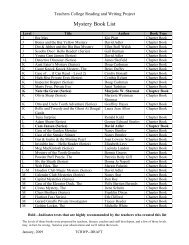TC Today - Teachers College Columbia University
TC Today - Teachers College Columbia University
TC Today - Teachers College Columbia University
Create successful ePaper yourself
Turn your PDF publications into a flip-book with our unique Google optimized e-Paper software.
Practice Makes Personal<br />
Helping his students improve has made Victor Lin a better musician and human being<br />
Victor Lin has recorded, performed his own compositions<br />
and drawn high praise from the jazz<br />
supernova Kenny Barron. Yet his musicianship<br />
has been equally galvanized by his students at the Stanford<br />
Jazz Workshop, the Mark O’Connor Fiddle Camp and<br />
<strong>Columbia</strong>'s Louis Armstrong Jazz Performance Program—<br />
including one who inspired Lin’s <strong>TC</strong> dissertation.<br />
“He asked me, ‘What do I practice?’” recalls Lin, an<br />
accomplished violinist, bassist and jazz pianist who is<br />
graduating this spring from the <strong>College</strong>’s Music and Music<br />
Education program. Without quite articulating it, Lin had<br />
pondered that issue his entire musical life. “I said, ‘Well,<br />
there are standard set of things everyone does, but just<br />
because I did things a certain way, doesn’t mean it’s most<br />
effective for you.’ And then I started to wonder, how did<br />
all the legends practice? What did they do?” And above all:<br />
how to make improvement a less “blind and self-propelled”<br />
process for his students than it had been for him?<br />
Lin was made to play classical piano and violin by his<br />
parents at an early age. He was blessed with an ability to<br />
recreate what he heard, a gift he used mainly to impress his<br />
friends by playing themes from video games and the latest<br />
pop songs. He joined his high school jazz band “because it<br />
was cool”—but resolved to take music seriously only after a<br />
friend laughed at his first attempt to solo.<br />
What if we taught kids from<br />
the get-go that excelling on a<br />
bunch of different instruments<br />
was the most ordinary thing?<br />
“I started listening to the music that we were playing and<br />
stealing everything,” he recalls. “It wasn’t until the fourth time<br />
I’d played the same solo that I realized I should change it. I had<br />
stumbled onto the way you’re really supposed to learn music.<br />
“A lot of my early experiences were like that,” he says.<br />
“You have this chip on your shoulder and you think, ‘I’m<br />
House pianist Lin has performed at the farewell for<br />
President Arthur Levine, the inauguration dinner for President<br />
Susan Fuhrman, and other <strong>TC</strong> events.<br />
going to show them.’ Then something else knocks you<br />
down, and you have to match that, too.”<br />
That was the sequence when he went to the <strong>University</strong><br />
of Washington at age 17 after Stanford had turned him<br />
down. Unsure whether he wanted to be a doctor, a lawyer<br />
or a professional musician, he spent his first year taking<br />
math, physics and music theory.<br />
“I’m at a huge university, feeling overwhelmed and taking<br />
classes that I hate, and my bubble gets burst,” he recalls.<br />
“It was humbling to discover that I was the worst jazz pianist<br />
there. I was so bad I didn’t even get into a group. I barely<br />
qualified for lessons. It was the ultimate reality check.”<br />
Lin became a Christian and spent the summer after<br />
freshman year working at a Salvation Army Camp, where<br />
he discovered music could really help him reach people.<br />
“Kids there don’t care about your training,” he says. “But<br />
they can sense if you care about them.”<br />
Lin focused harder on music, and when he discovered<br />
Barron’s album People Time, with saxophonist Stan Getz,<br />
he knew he didn’t want to be a doctor or a lawyer. After<br />
graduating, he moved east to study with Barron at Rutgers.<br />
He took lessons with Barron once a week for three<br />
years, a process he found fascinating and frustrating. “He’d<br />
have a piano, I’d have a piano, and we’d kind of go at it<br />
14 T C T O D A Y l s p r i n g 2 0 1 1



